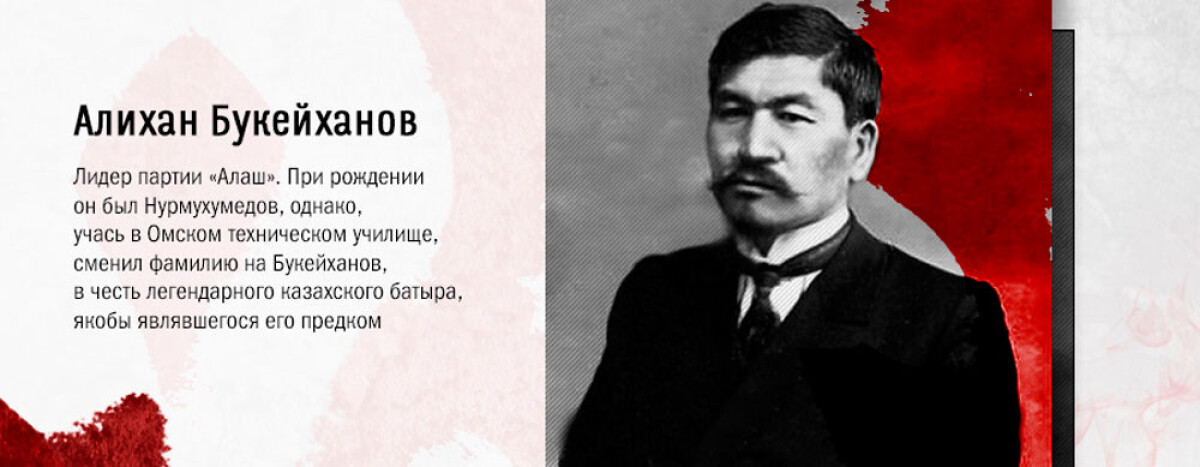
A.Bukeikhanov was an ideologist of the first national newspaper ‘Kazakh’ and defended fundamental interests of people in journalism. Khairetdin Bolganbayev’s journalistic talent formed and strengthened on its pages. It helped Khairetdin to understand the real life, see the problems directly related to the interests of Kazakh people.
‘Kazakh’ newspaper was very popular in the steppe, spread all the corners and remote regions’. Articles by writers, lawyers, doctors, teachers and students important topics of the life were published on its pages.
‘We are glad to see active participation of the prominent intellectuals and people’s sympathetic attitude, it shows that we can hope for its bright future’,-Kh.M.Abzhanov wrote.
According to D.Kamzebekuly, members of the National Science Academy, doctors of historical sciences, ‘problems of education, land, settlers, ethnic group, religion, women and children, power, justice, language initially were raised from the standpoint of Kazakhs’ socialization, and by the time of highest escalation of the crisis and empire collapse, they were linked to solution of the specific tasks for establishment of a sovereign state. Thus, the change in public consciousness and political culture allowed us to find a national idea, which, in turn, predetermine the fates of millions’.
A.Bukeikhanov and Kh.Bolganbayev met in 1916 in Minsk at the second time. In 1916, Khairetdin was one of the first, who went through Moscow and Minsk with humanitarian mission (carrying food, warm clothes and shoes) to Gantsevichi station, the ninth civil engineering squad in the midst of the First World War, when the Kazakh population was mobilized to the rear works by the Imperial Decree.
Akhmet Baitursynov and Mirzhakyp Dulatov delegated him there and Alikhan Bukeikhanov headed Foreign Department and was in charge of that mission in Minsk at ‘Zemgar’ Western Committee.
A.Bukeikhanov and Kh.Bolganbayev met on 17 March 1917 at the third time in Minsk, when they sent a historical telegram to the homeland with their comrades-in-arms M.Dulatov, Sh.Alzhanov, I.Tokhtabayev, R.Marsekov, N.Tyuryakulov, T.Zhamanmurynov: ‘The sun of liberty equality and fraternity rose for all the people of Russia. Kyrgyz people must be organized to support news system and new government. Our slogan is: ‘Democratic republic should belong to those who are engaged in cattle breeding and agriculture’,-the text of the telegram was published in the newspaper ‘Kazakh’.
A.Bukeikhanov and Kh.Bolganbayev met at I all-Kyrgyz Congress in Orenburg on 21-28 July 1917 at the fourth time, where territorial-national autonomy within a Russian democratic federation was demanded.
At the fifth time, A.Bukeikhanov and Kh.Bolganbayev met at II all-Kyrgyz Congress in Orenburg on 5-15 December 1917, where the establishment of Alash Autonomy was announced, they elected its government – Alash-Orda as well. The delegates (Alikhan and Khairetdin) who stood behind the declaration of autonomy on clarifying the relation of non-Kyrgyz population of the steppe regions to Kyrgyz-Kazak autonomy and formation of people’s militia, were against of immediate declaration of autonomy.
Kh.Bolganbayev met with Zaki Validi Togan by A.Bukeikhano’s order, who led Basmachi movement with Enver-Pasha in Bukhara. It is expected that an attempt to prevent blood-letting was mate during the meeting.
By the order of OGPU Board under the Council of People’s Commissars of the USSR dated by 4 April 1930: Akhmet Baitursynov, Mir-Yakub Dulatov, Myrza-gazy Espolov, Dinmukhamed (Dinshe) Adilov, Zhussupbek Aimatuytov, Khairetdin Bolganbayev, Gazymbek Birimzhanov, Khalel Gabbasov, Akhmed-Safa were sentenced to death for:
-organization of counter-revolutionary authority in Oreburg in 1921, for contacts with the head of pan-Turkist organization in Central Asia Zaki Validov;
-holding the meeting on intention of organizing an armed uprising in the steppe and preparation to leave to the steppe;
-attempt of assassination against the secretary of the Kazakh Regional Committee of F.Goloschekin in 1927;
-Yussupov A.S. – even he was the agent of OGPU, he did not reported about Birimzhanov’s departure to Validov.
Later Kh.Bolganbayev’s shooting was changed for 5 years in a forced labor camp in Western Siberia. At last time, A.Bukeikhanov met with Kh.Bolganbayev in Moscow in 1934 after Khairetdin’s exile in Arkhangelsk and Syktyvkar.
Great Magzhan Zhumabayev appreciated highly Khairetdin Bolganbayev, expressing his admiration of his deeds with the words: ‘a flawless man who has no peers’.
A.Bukeikhanov and Kh.Bolganbayev were shot in 1937.
Alikhan Bukeikhanov and Khairetdin Bolganbayev were countrymen, both were from Karaganda region, Bukeikhanov was from Aktogay district, Bolganbayev was from Nurisnk dictrict.
Kazakh autonomy as a national idea passed through the hearth of trial. Although the Bolsheviks destroyed Alash movement, they were forced to reckon with its brilliant idea. They understood that public establishment of Kazakhs cannot be lower than autonomy. This scanty autonomy of Kazakhs was declared at the 3rd year of the Soviet authorities.
The finest hour of the national idea of ‘Kazakh autonomy’ struck on 16 December 1991. ‘At the beginning of the XX century, the task of developing Kazakh national idea was realized by spiritual/intellectual elite’,-was emphasized in ‘In the stream of history’ by Nursultan Abishevich Nazarbayev. ‘The personal fate of great Kazakh statesmen in the early twentieth century was tragic. However, the lessons of national courage and national maturity are not forgotten’.
Kamelov (Astana)
Grandson of Alash representative Kh.Bolganbaiuly.
Used materials:
1. Kh.M.Abzhanov. Ch.Valikhanov Institute of History and Ethnology, Almaty
2. D.Kamzebekuly , Аlash-Оrda, Kh. Bolganbay, Iman kushi, Аlmaty, «Аrys», 2009, p. 3-36.
3. «Kazak» newspaper 1917, №223 (Аlikhan Bukeikhanov. Shygarmalar. Аlmaty: Kazakhstan, 1994. p. 232-233).
4. №140 Resolution of all-Kazakh Congress, Orenburg, 21-26 July 1917.
5. № 182 Protocol of the meeting of All-Kirgiz Congress, Orenburg, 5-13 December 1917.
